|
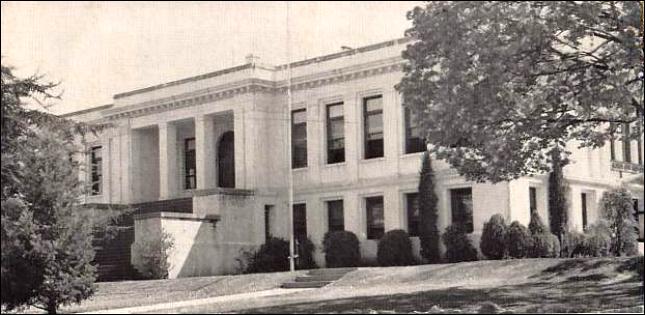
Nevada City High School in the 1940s.
Nevada City High School class of 1946
shares history
By
Jennifer Terman
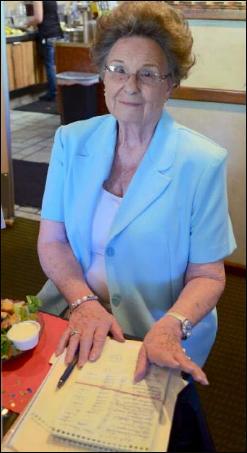
Nevada County has
experienced quite a bit of change over the course of the last 70 years,
something identified often during an informal reunion last week of the
1946 Nevada City High School graduating class.
“This class I’m a part of is celebrating our 67th
year since we graduated from high school — it’s a pretty special class,”
said event organizer Beverly Kilroy (left). “We go back to 1934, when we
first started our journey through school in the old Washington School,
which was built in 1873 shortly before they built the Nevada City
Elementary.”
According to an article from the Nevada County Historical Society by
Doris Foley in July 1977, Nevada City High School existed from 1862 to
1952. Public education for elementary children began in 1853 at the
corner of Main and Washington streets until an 1856 fire destroyed the
building.
The school was continued in a building at School and North Pine streets
called the Washington School that was an elementary, grammar and high
school, said Kilroy.
The need for a secondary education was recognized in 1862, according to
the article. The brick home of C.M. Foster at the corner of High and
Nevada streets was purchased, and Nevada City High School opened Nov. 3,
1862, as the third oldest high school in the state.
When the school became too full, a high school was
built on a portion of Lopez Ranch and Zion Street in 1912. The original
Nevada City High School building was demolished in 1985, as repairs for
the crumbling building were not approved by Nevada City voters.
In 1952, though classes continued at the location, Nevada City High
School and Grass Valley High School became the Nevada Joint Union High
School District. Ten years later, Nevada Union was built and the schools
conjoined at the current Ridge Road location.
The graduating class of 1946 has about 12 or 13 people still alive,
Kilroy said. Graduates and friends and family attended an informal
reunion at Perko’s in Grass Valley Thursday and shared stories of the
past. Joyce Bauman received her elementary education at Blue Tent School
near Bloomfield Road, a one-room schoolhouse with eight students, many
of whom had learning issues, she said.
“A teacher brought students that were in trouble in elementary school to
teach them at a little country school, so I met a lot of characters when
I was growing up,” Bauman said, adding that her teacher, Mrs. Gleason,
“did marvelous things with kids who were having trouble learning.”
The Blue Tent school shut down about 40 years ago, Bauman said.
One of the darker aspects of the time the class of 1946 was in school
was the second World War and subsequent wars post-graduation.
“During the war, it wasn’t very good,” said Sam Pello. “Then, of course,
a couple years later, I get out of high school and got drafted for the
Korean War. I was there in 1951. I’ve seen plenty of combat,” he said.
“I’m lucky to be here.”
Pello also mentioned happier times, like when against all odds Nevada
City High School beat the much larger Placer County High School on the
football field. “We were the smallest high school around, and we beat
Placer 14-0 the first time ever,” he said. “They had 700 (students) and
we had 200. It was real great playing that game.”
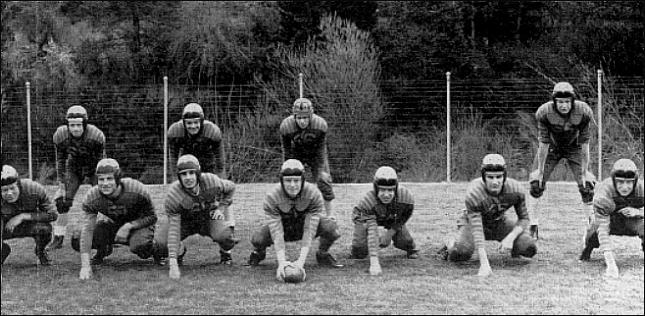
NCHS Yellowjackets 1944. Front L-R D: Moore, F.
Fontana, M. Roberts, D. Atkins, D. Rosynski, R. Molthen, R. Walker. Back
L-R: O. Ronningen, S. Pello, M. McGuire, W. Hawkins. Not pictured: E.
Helme, D. Miller, R. Ronningen. (From Martin Keith Marsh's book "The
Yellowjackets").
Bauman said the small school allowed students the ability to be
involved in several different sports and activities. “As a small school,
we were involved in so many things,” she said. “Nevada City was a great
town to grow up in. We could walk home from school and not worry about
anybody bothering us. There were no drugs. Things are so different now.”
The economic landscape was very different as well, Bauman said, adding
that when she was younger the area was involved with mining. She
remembered when they started to close and the lumber market became more
prevalent.
Pello mentioned how many orchards there were around town. “All this was
orchards,” he said, referring to Grass Valley. “Where Sierra College is,
that was all orchards. There were about 50 people out there, school
teachers and doctors picking fruit in the early days in the late ’40s,
early ’50s. It was really great.”
Downtown Nevada City was also different than today, Bauman said, as
downtown was filled with about 11 bars — quite the change from the
multitude of gift shops and stores that line the streets today. The
demographics and sense of community has also changed, she said. “It’s
become a retirement community. It wasn’t like that then,” she said.
“There were cattle ranchers and an active community.”
Dennis Smith, who went by Denny in high school, also mentioned the
strong sense of community the older days enjoyed. “Everybody knew
everybody, and everybody was friendly,” he said.
Donald Ellis and his sister, Genevieve Ingram, came to Nevada County in
1940 after moving to several locations because their father, Guerdon
Ellis, worked in the U.S. Forest Service and transferred to Tahoe
National Forest. “I got here the latter month or so in the sixth grade,”
Ellis said. “I graduated from Nevada City Grammar School and high school
and even did some time in Auburn. It’s called Sierra College now, but it
used to be Placer Junior College,” he said. Ellis described the football
team, which had only 18 players, and his time as a bench warmer because
of his lack of coordination, he said. “I was sitting in the trenches all
the time,” he said. “Most of the good athletes would play offense and
defense, and I sat on the bench.” (This article appeared in The Union
newspaper September 24, 2013. To contact Staff Writer Jennifer Terman,
email jterman@theunion.com or call 530-477-4230. )
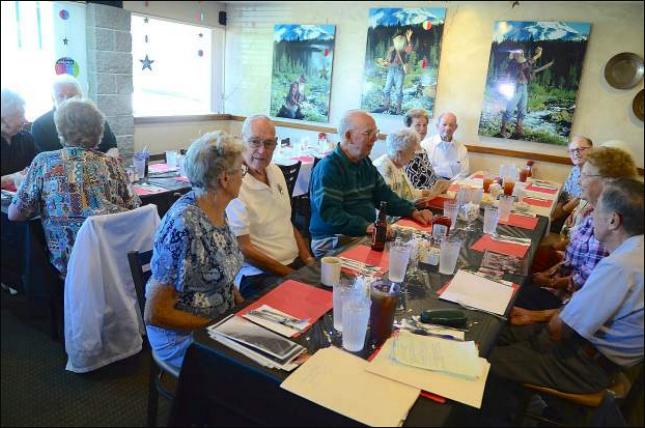
Reunion luncheon at Perko's Cafe.
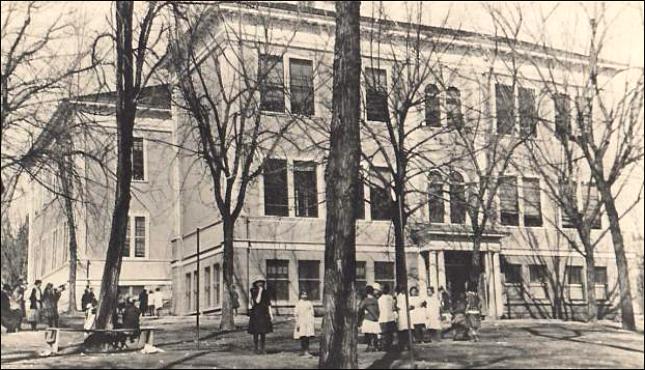
Washington School (Grammar and High School) 1869 - 1912.
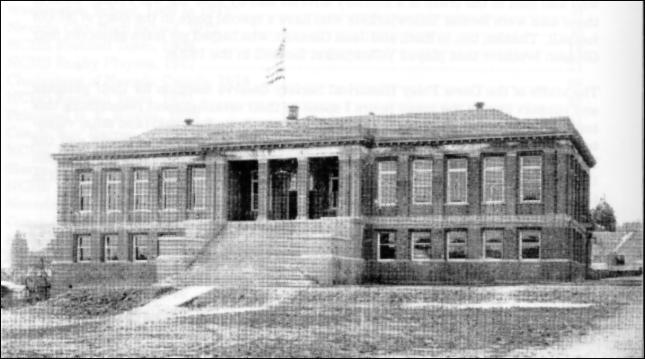
Nevada City High School 1912.
According to
Keith Marsh's story, the move to the new
Grammar School (below)
took place during bad weather on January 4, 1937.
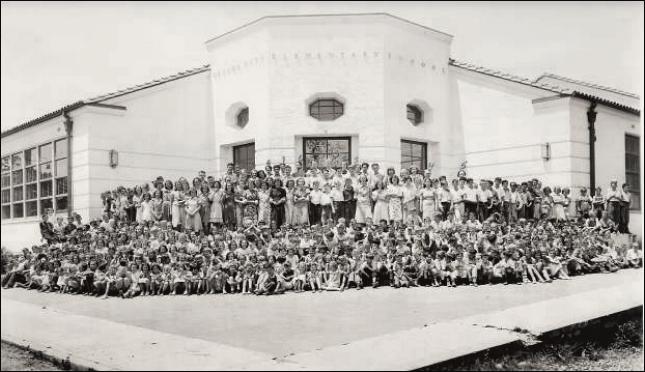
Students at Nevada City Elementary School in the
late 1930s.
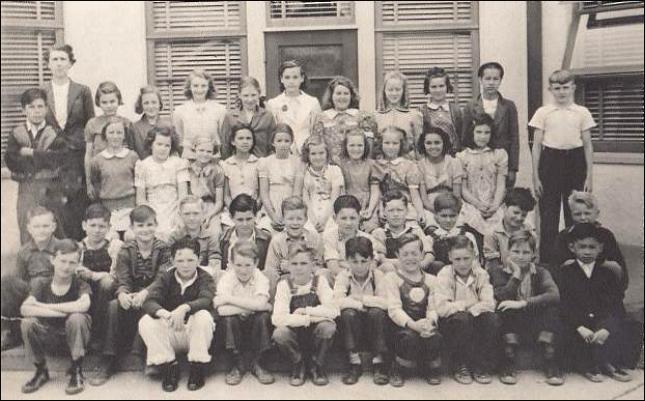
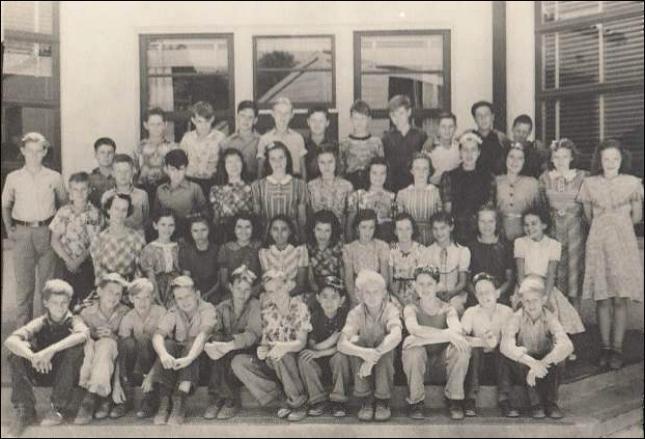
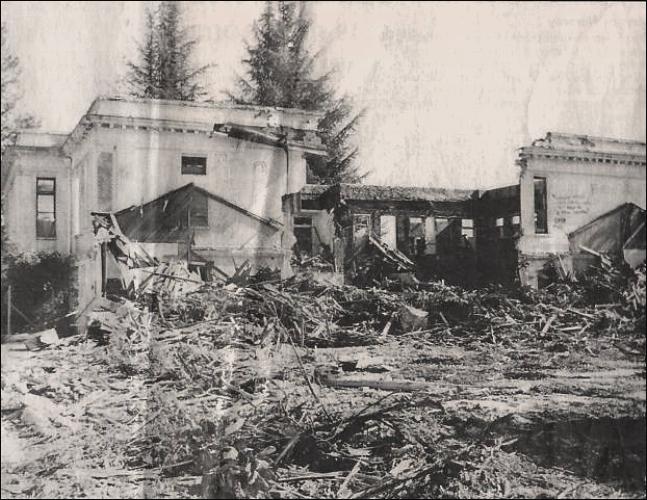
Nevada City High School demolished in 1985.
Back
|









